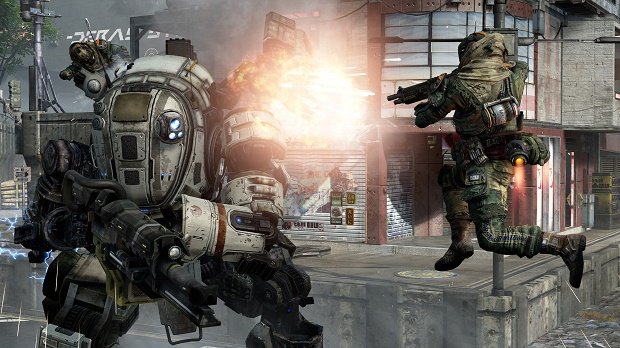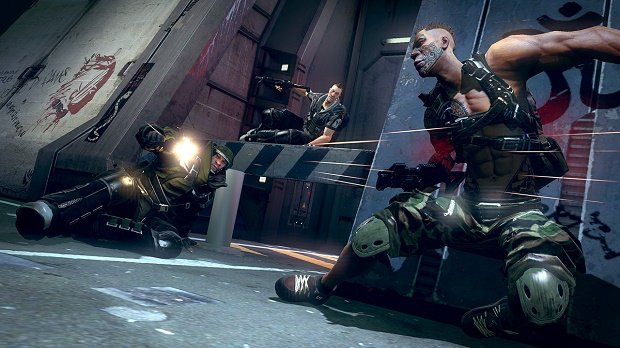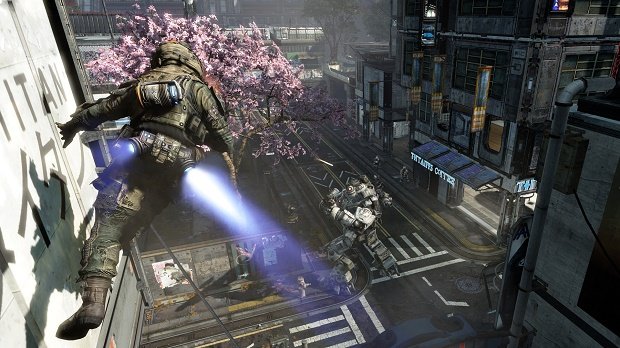Why are multiplayer-only games such a hard sell? Just ask Titanfall
Don't look at the first few months of a new year as a gaming dead zone; they're more of an opportunity. It's a good time to decompress from the deluge of the previous holiday's onslaught, and reflect on the games you played over the past 12 months; maybe give some of those you neglected a second chance. So this year, since most of January's releases were already games I'd played before, I decided to hop back into Titanfall. My crew of friends and I played it for about a week when it came out last March, stomping around and dropping hulking mechs out of the sky, before we moved on to the next, big thing (or just went back to playing Dota 2). So I hopped in for a few rounds, to kill some time and see if the game was still as fun as I'd remembered.
Yep, leaping from building to building and strapping into a walking death tank is still awesome. Titanfall's incredibly fast pace makes it thrilling in a way many first-person shooters just aren't, constantly giving you ways to look like a badass. Plus, it's a shooter I'm actually good at, so that helps out a bit, too. Oh, also: no one is playing it.

When I logged back in, I saw the current active player count hovering around 3,000 users or so on Xbox One. Worldwide. Most players stick to Attrition (Titanfall's fancy name for team deathmatch), and many of the other modes like Capture the Flag or Last Titan Standing typically only have a few dozen players keeping the dream alive. God help you if you bought the Season Pass before it was given away for free and wanted to give those additional maps a whirl, because you'll likely have about five to ten people to play with at a given time. And since Titanfall was pimped out by Microsoft as a console exclusive system-seller, the PC version's audience is likely even smaller.
Turns out I wasn't the only one who gave up on it.
This was supposed to be The Game That Launched Next-Gen. The hype felt enormously real at E3 2013, and it persisted until its March 2014 release (unlike Evolve, whose momentum slowly trudged across the finish line like one of its lumbering beasts). It has the pedigree, with a studio consisting of Call of Duty alums. It has the backing of one of the largest video game publishers on the planet. And even outside of the Season Pass content, Titanfall saw numerous updates bringing welcome additions, like a black market for buying Burn Cards, and daily challenges. So what happened?

It's the same thing that happened to other multiplayer-only, fully-priced games like Brink or Shadowrun, or even smaller titles like Monday Night Combat. They became virtual ghost towns after mere months, and their servers shut down well before they could build up any momentum. Titanfall had a chance to learn from previous failures like these, but it seems to have fallen into the same traps, turning it into a barren wasteland way sooner than I'm sure its creators had intended.
What do Titanfall and countless other multiplayer-only games seem to lack? Well, for one, they don't have a sustaining hook to keep players invested. Plus, their price point doesn't match what they offer.
Weekly digests, tales from the communities you love, and more
Players expect more out of their games now, and it's not enough to sprinkle in a meager set of progression breadcrumbs in order to entice an audience for a multiplayer-only game, let alone sustain it. It's been months after release and, whatever your opinions on it may be, Destiny still commands a sizable and consistent player base, because it uses the promise of loot, daily and weekly quests, and faction grinds to keep players running on that content treadmill. Dota 2 and League of Legends have the massive character roster to allow for virtually endless strategic combinations, and their built-in eSports communities keep players talking about and dissecting the game.

It's not just about shoehorning in loot drops or reaching out to eSports enthusiasts, though. Call of Duty sustains players through a variety of methods, which is why it still has a six-hour single-player campaign and those goofy extra zombie/alien modes. Sure, Activision could probably make money selling a stand-alone multiplayer-only Call of Duty game, but the additional modes add perceived value to the package, even if a lot of people only want to play a round of Kill Confirmed with their friends.
Not everyone is willing to plunk down 60 bucks just to kill randos on the internet, and many consumers (myself included) want to experience a hand-crafted roller coaster ride before diving onto Xbox Live and getting our asses handed to us. Having multiplayer and single-player modes operating side-by-side ensures that there's a palate cleanser available if you start to lose the taste for whatever you're currently chewing through. Bonus points if you figure out ways to create a universal player progression system that rewards engagement across all the modes.
But Titanfall doesn't have any of that stuff. Titanfall's draws are its unique methods of maneuvering around each map, coupled with the Titans themselves. For the first few dozen matches, dancing circles around your foes by boost-jumping and wall-running is a transcendent experience. Dropping Titans and using them to wreck house feels really good, an audio-visual feast for the senses. But after a while, when you've run through all the different maps and modes and the initial adrenaline high wears off, the facade begins to crack.

Titanfall has no single-player mode to speak of (and its multiplayer radio drama campaign certainly doesn't count). And it hands you the most versatile weapons right off the bat, leaving the carrot on the end of the stick far less appetizing than the one you've got in your hand. The addition of Burn Cards (for an extra boost mid-battle) and some customization options help, but their effect on player longevity is fleeting.
Once you've boosted off the top of a wrecked Titan, you've done it a million times, and you're left to question why you should continue playing, especially if all your friends have moved on to the next big game of the moment. And by the time that $60 price tag drops to something more enticing to a casually interested audience, the player base has already moved on.
Online multiplayer-only games are a hard sell if you're charging a price of entry, and they're especially difficult to keep alive if you don't have a way to guarantee an audience will return days - let alone months - down the line. And the swift abandonment of games like Brink, Titanfall, and, in all likelihood, Evolve, prove that you need more than solid multiplayer to ensure lasting sales and a player base that will stick around for longer than a week.
So let's pour one out for Titanfall and all those other multiplayer-only games that lived too fast and died too young. We hardly knew you - but the way you were made, I guess that shouldn't surprise us.



